Compared to a few years ago, many people were skeptical about the future of electric vehicles, but now most people admit that electric vehicles are the future of the automobile industry. Basically, there are 3 main groups of policies that countries are applying to develop electric vehicles, which are: Incentives for manufacturers; support for electric vehicle buyers and support for infrastructure development to serve electric vehicles. Many support and incentive policies for manufacturers are being proposed so that they can confidently invest in green vehicles.
Creating a foundation for electric vehicle development
Recently, the electric vehicle industry has made strong development marks. In addition to the efforts of enterprises, Vietnam has had many policies and guidelines on developing the automobile industry, especially encouraging the development of low-emission or zero-emission vehicles.
With the aim of encouraging the production and consumption of environmentally friendly products, the 2018 Law on Special Consumption Tax stipulates that electric cars have a lower tax rate than internal combustion engine cars with the same carrying capacity or number of seats.
Specifically, the special consumption tax rate for internal combustion engine cars ranges from 15-150% depending on the vehicle model and cylinder capacity. For hybrid electric vehicles (HEV, PHEV), vehicles using bio-energy, in which the proportion of gasoline energy used is not more than 70%, the special consumption tax rate is 70% of the tax rate applied to gasoline and diesel vehicles with the same cylinder capacity. For pure electric cars (BEV, FCEV) with 9 seats or less, the special consumption tax rate is 15%, from 10 to less than 16 seats is 10%, from 16 to 24 seats is 5%, and the type that can carry both passengers and goods is 10%.
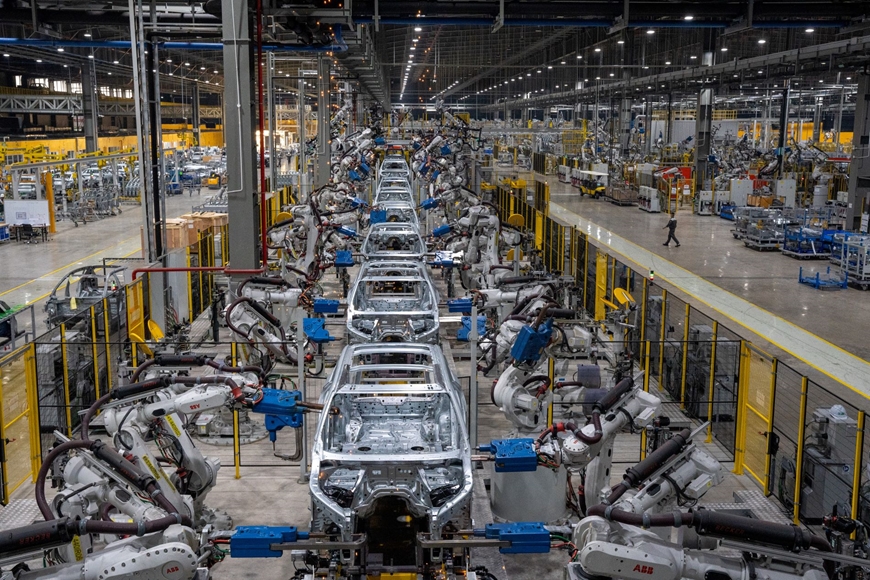 |
| Electric car production line with high level of automation in Vietnam. Photo: BAO LINH |
The special consumption tax on battery-powered electric cars will also be reduced from March 1, 2022 according to the Law amending the Law on Public Investment, the Law on Investment under the Public-Private Partnership model, the Investment Law, the Housing Law, the Bidding Law, the Electricity Law, the Enterprise Law, the Special Consumption Tax Law and the Law on Civil Judgment Enforcement passed by the 15th National Assembly . Specifically, the special consumption tax rate for each type of electric car will be reduced to 1-3% (applied from March 1, 2022 to February 28, 2027) and 4-11% (applied from March 1, 2027).
The Government has issued Decree No. 10/2022/ND-CP stipulating a 0% registration fee for battery-powered electric cars registered for the first time within 3 years from March 1, 2022. In the next 2 years, this fee will be 50% of the fee for gasoline and diesel vehicles with the same number of seats. For vehicles registered for the second time onwards, the registration fee to be paid is unified nationwide at 2%, applied to both electric vehicles and vehicles using internal combustion engines.
How do countries promote electric vehicle development?
It can be seen that the support policies for the electric vehicle industry in Vietnam have initially created momentum for the development of electric vehicles. However, compared to countries in Southeast Asia or around the world , the above policies are still quite modest. According to statistics, the total investment of countries to support the electric vehicle manufacturing industry through direct activities such as purchasing and tax cuts is 14 billion USD (in 2020).
Over the years, Norway has become a global pioneer in the field of electric motors with an increasing number of vehicles, as of the end of June 2019 there were about 342,367 vehicles including 237,710 electric passenger cars, trucks and 104,657 electric hybrid vehicles. By 2019, the market share of electric cars had exceeded 50% of the total number of cars.
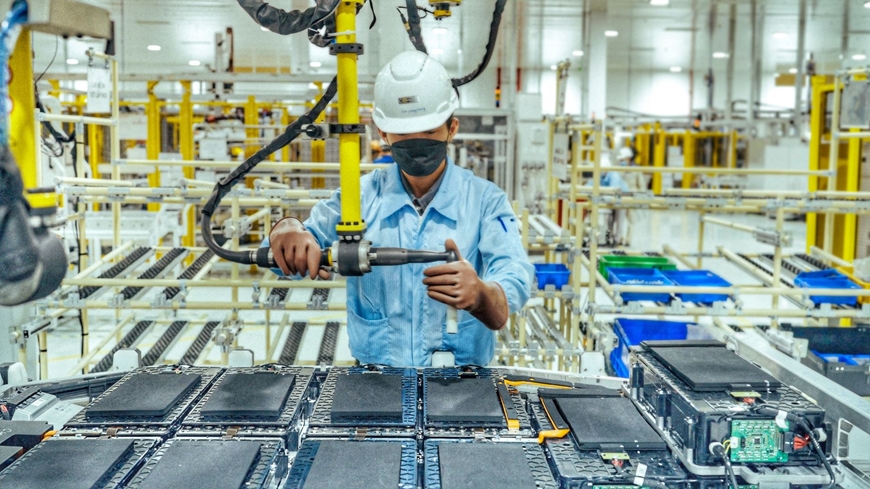 |
Assembling batteries for electric vehicles. Photo: BAO LINH |
The Norwegian government's basic preferential policies such as tax reductions and subsidies as well as annual free parking policies have encouraged electric vehicle consumers. In addition, the government also introduced policies exempting annual road tax, public parking fees, and using bus lanes.
Many other countries in Europe also implement measures to encourage and subsidize electric vehicles; preferential policies for electric vehicles when traveling in urban areas such as: exemption and reduction of parking fees, fees to enter the inner city... Although the subsidy level is not large if calculated on a unit of one vehicle, these policies still create a strong effect on consumers, encouraging users to buy electric vehicles to enjoy more incentives than traditional internal combustion engine vehicles.
Or in China, this country is leading the global electric vehicle market, accounting for 44% of the world's total electric vehicles, registering more than 4 million electric cars, 300 million electric two-wheelers (more than 50% of the global market) and more than 420,000 electric buses (99% of the global market) in 2020. From 2009 to 2022, the Chinese government has allocated more than 200 billion yuan (equivalent to 29 billion USD) in subsidies and tax breaks for electric vehicles, supporting electric vehicle companies to maintain operations in the early years, and implementing preferential policies to encourage people to buy electric vehicles.
One of China's special policies is that the government's preferential policies and subsidies are not limited to domestic companies but also apply to foreign car manufacturers. According to experts, the development of the Chinese electric vehicle industry is deeply tied to Tesla (USA) when it offers positive incentives to invite Tesla to build production facilities in this country.
Tesla's Gigafactory in Shanghai was built extremely quickly in 2019 thanks to favorable local policies and has now become Tesla's most efficient production center, accounting for more than half of Tesla vehicles delivered in 2022.
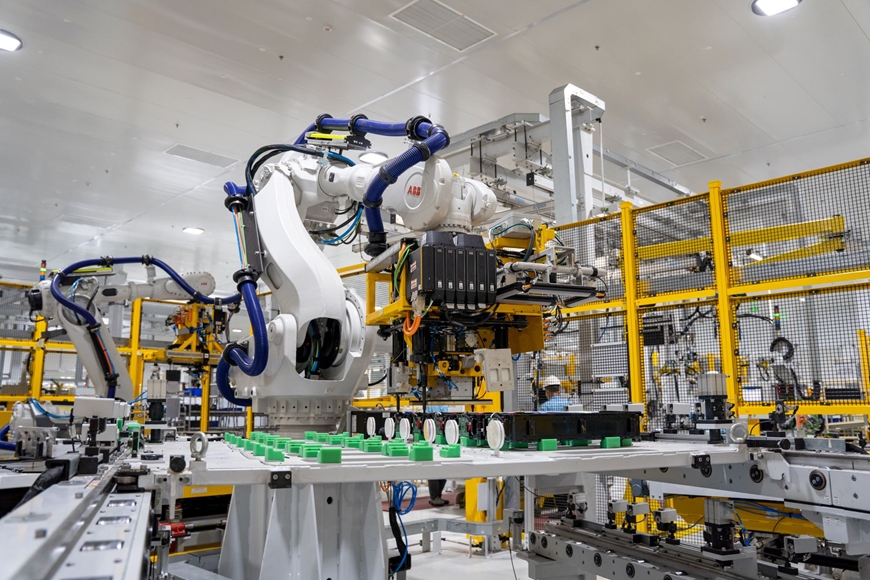 |
| Robotic arm in electric vehicle production and assembly line. Photo: BAO LINH |
Need “midwife” policies for electric vehicles
For Vietnam, experts and businesses in the automobile sector have noted that Vietnam has almost no other support policies on credit, investment, and trade for businesses operating in the electric vehicle sector. One of the difficulties in implementing credit for electric vehicle development is that electric vehicle projects often require large capital sources, maintained for a long time, requiring banks to have large and long-term capital. Along with policies, infrastructure, and unsynchronized regulations and standards are also factors that greatly affect the development of electric vehicles in Vietnam.
Many experts also believe that the development of electric vehicles depends on three main pillars: legal framework, support policies of countries; additional incentives to protect electric vehicle sales from economic recession and the number of electric vehicle models is expanded and battery prices are reduced; in which policy plays an important role.
Specifically, Mr. Pham Tuan Anh, Deputy Director of the Department of Industry (Ministry of Industry and Trade) proposed to apply special consumption tax rates on electric cars based on the level of CO2 emissions into the environment. This is a policy that has been successfully applied in many countries around the world to limit production activities that cause environmental pollution, prioritize the development of green industry, create fairness in tax policy and not affect the State budget revenue.
At the same time, there is a policy of direct support from the state budget to reduce investment costs - especially costs for research and development; purchase and transfer of technology - for large-scale electric car production and assembly projects. Focus on developing infrastructure for electric vehicles (charging stations, traffic infrastructure, land for charging stations, etc.); develop infrastructure for electric vehicles (charging stations, traffic infrastructure, land for charging stations, etc.).
To stimulate the electric vehicle market, Mr. Dao Cong Quyet, Head of the Public Relations Subcommittee, Vietnam Automobile Manufacturers Association (VAMA) continued to emphasize that from now until 2030, special consumption tax, registration fees and related taxes and fees should continue to be preferential for each electric vehicle model. Regarding charging stations, standards must be set to support the strong development of fast charging networks and home charging.
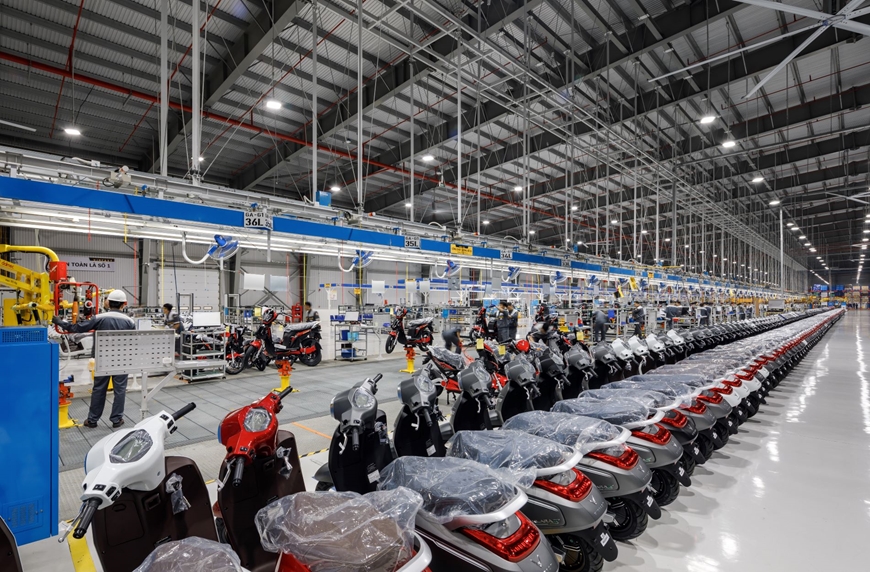 |
| Electric motorbikes are ready to leave the factory in Vietnam. Photo: BAO LINH |
At the same time, support for factory construction, support for research and development activities... with manufacturing enterprises. "These incentives will gradually decrease in the next stage when electric vehicles have a certain market share. After 2050, electric vehicles will not need separate support policies," Mr. Dao Cong Quyet suggested.
Notably, in Decision No. 876/QD-TTg dated July 22, 2022 of the Prime Minister approving the Action Program on green energy conversion, carbon and methane emission reduction of the transport sector, specific tasks were assigned to ministries and branches.
In particular, the Ministry of Industry and Trade takes the lead in developing the industry of manufacturing vehicles and transportation equipment using electricity and green energy; producing and supplying electricity and green energy to replace fossil fuels to meet domestic demand; expanding the blending and supply of biofuels; developing electric charging systems and green energy for vehicles.
The Ministry of Transport shall take the lead in developing and perfecting institutions and policies related to improving energy efficiency, converting to using electricity and green energy for green vehicles, equipment and infrastructure in transport; investing in developing the transport infrastructure system according to the planning; developing human resources ready to receive, transfer, manage, exploit and operate new technologies on green vehicles, equipment and infrastructure.
Under the direction of the Prime Minister, the Ministry of Industry and Trade is coordinating with ministries and branches to develop a Strategy for the development of Vietnam's electric automobile industry until 2035, with a vision to 2050, with one of the focuses being the development of electric cars and environmentally friendly cars.
MANH HUNG - VU DUNG
*Please visit the Economics section to see related news and articles.
Source




![[Photo] Panorama of the Opening Ceremony of the 43rd Nhan Dan Newspaper National Table Tennis Championship](https://vphoto.vietnam.vn/thumb/1200x675/vietnam/resource/IMAGE/2025/5/19/5e22950340b941309280448198bcf1d9)


![[Photo] Close-up of Tang Long Bridge, Thu Duc City after repairing rutting](https://vphoto.vietnam.vn/thumb/1200x675/vietnam/resource/IMAGE/2025/5/19/086736d9d11f43198f5bd8d78df9bd41)
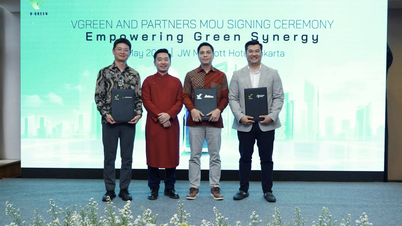




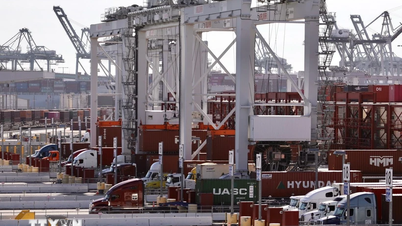






















![[Photo] President Luong Cuong presents the 40-year Party membership badge to Chief of the Office of the President Le Khanh Hai](https://vphoto.vietnam.vn/thumb/1200x675/vietnam/resource/IMAGE/2025/5/19/a22bc55dd7bf4a2ab7e3958d32282c15)




























































![[VIDEO] - Enhancing the value of Quang Nam OCOP products through trade connections](https://vphoto.vietnam.vn/thumb/402x226/vietnam/resource/IMAGE/2025/5/17/5be5b5fff1f14914986fad159097a677)


Comment (0)